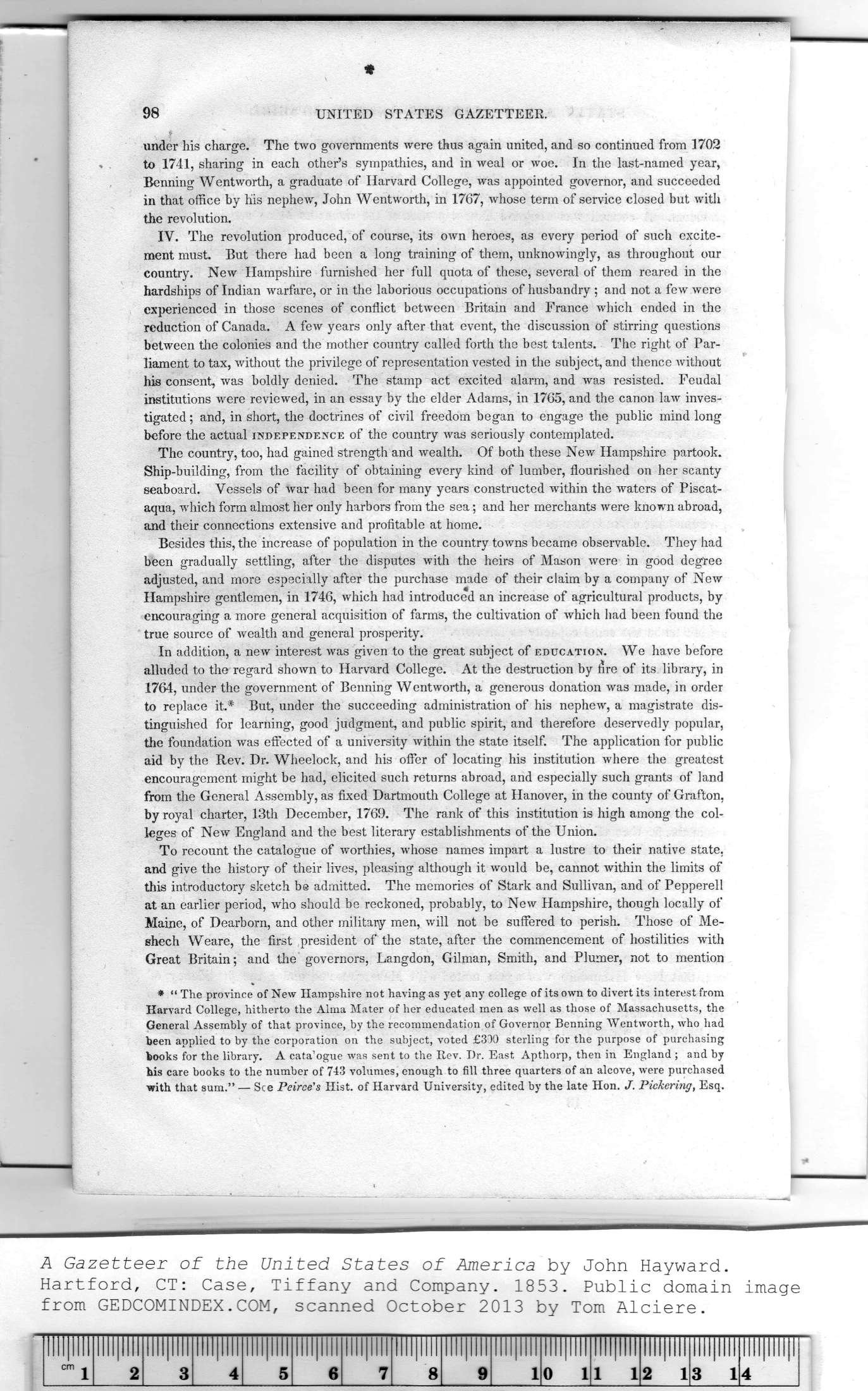|
|
Note: Ctrl and + increases the font size of the text below, Ctrl and - decreases it, and Ctrl and 0 resets it to default size.
98 UNITED STATES GAZETTEER.
under his charge. The two governments were thus again united, and so continued from 1702
to 1741, sharing in each other's sympathies, and in weal or woe. In the last-named year,
Benning Wentworth, a graduate of Harvard College, was appointed governor, and succeeded
in that office by his nephew, John Wentworth, in 1767, whose term of service closed but with
the revolution.
IV. The revolution produced, of course, its own heroes, as every period of such excite-
ment must. But there had been a long training of them, unknowingly, as throughout our
country. New Hampshire furnished her full quota of these, several of them reared in the
hardships of Indian warfare, or in the laborious occupations of husbandry ; and not a few were
experienced in those scenes of conflict between Britain and France which ended in the
reduction of Canada. A few years only after that event, the discussion of stirring questions
between the colonies and the mother country called forth the best talents. The right of Par-
liament to tax, without the privilege of representation vested in the subject, and thence without
his consent, was boldly denied. The stamp act excited alarm, and was resisted. Feudal
institutions were reviewed, in an essay by the elder Adams, in 1765, and the canon law inves-
tigated ; and, in short, the doctrines of civil freedom began to engage the public mind long
before the actual independence of the country was seriously contemplated.
The country, too, had gained strength and wealth. Of both these New Hampshire partook.
Ship-building, from the facility of obtaining every kind of lumber, flourished on her scanty
seaboard. Vessels of war had been for many years constructed within the waters of Piscat-
aqua, which form almost her only harbors from the sea; and her merchants were known abroad,
and their connections extensive and profitable at home.
Besides this, the increase of population in the country towns became observable. They had
been gradually settling, after the disputes with the heirs of Mason were in good degree
adjusted, and more especially after the purchase made of their claim by a company of New
Hampshire gentlemen, in 1746, which had introduced an increase of agricultural products, by
encouraging a more general acquisition of farms, the cultivation of which had been found the
true source of wealth and general prosperity.
In addition, a new interest was given to the great subject of education. We have before
alluded to the regard shown to Harvard College. At the destruction by fire of its library, in
1764, under the government of Benning Wentworth, a generous donation was made, in order
to replace it.1 But, under the succeeding administration of his nephew, a magistrate dis-
tinguished for learning, good judgment, and public spirit, and therefore deservedly popular,
the foundation wras effected of a university within the state itself. The application for public
aid by the Rev. Dr. Wheelock, and his offer of locating his institution where the greatest
encouragement might be had, elicited such returns abroad, and especially such grants of land
from the General Assembly, as fixed Dartmouth College at Hanover, in the county of Grafton,
by royal charter, 13th December, 1769. The rank of this institution is high among the col-
leges of New England and the best literary establishments of the Union.
To recount the catalogue of worthies, whose names impart a lustre to their native state,
and give the history of their lives, pleasing although it would be, cannot within the limits of
this introductory sketch be admitted. The memories of Stark and Sullivan, and of Pepperell
at an earlier period, who should be reckoned, probably, to New Hampshire, though locally of
Maine, of Dearborn, and other military men, will not be suffered to perish. Those of Me-
shech Weare, the first president of the state, after the commencement of hostilities with
Great Britain; and the governors, Langdon, Gilman, Smith, and Plumer, not to mention
A Gazetteer of the United States of America by John Hayward.
Hartford, CT: Case, Tiffany and Company. 1853. Public domain
1
“ The province of New Hampshire not having as yet any college of its own to divert its interest from
Harvard College, hitherto the Alma Mater of her educated men as well as those of Massachusetts, the
General Assembly of that province, by the recommendation of Governor Benning Wentworth, who had
been applied to by the corporation on the subject, voted £330 sterling for the purpose of purchasing
books for the library. A cata'ogue was sent to the Rev. Dr. East Apthorp, then in England ; and by
bis care books to the number of 743 volumes, enough to fill three quarters of an alcove, were purchased
with that sum." — See Peirce's Hist, of Harvard University, edited by the late Hon. J. Pickering, Esq.
|
